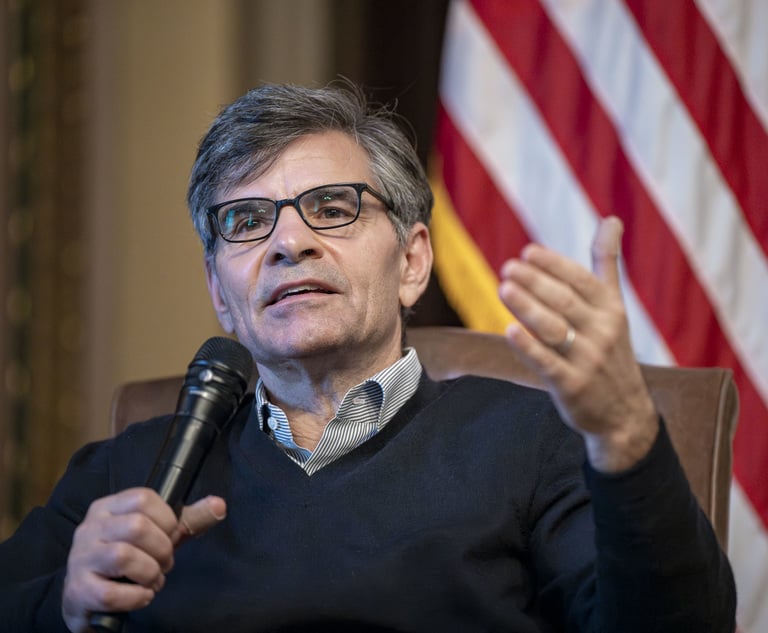Of Course! SCOTUS Appears Split Over How to Handle Split Decisions
Some justices seemed sympathetic to the problems caused by splintered opinions for lower court judges especially when, as Chief Justice John Roberts Jr. put it, “If I'm a court of appeals judge, it seems to me the most important thing in deciding the case is to make sure that I'm not reversed.”
March 27, 2018 at 04:25 PM
4 minute read
The original version of this story was published on National Law Journal

It is rare, bordering on never, for the U.S. Supreme Court to discuss during an oral argument how it makes its decisions and how they should be interpreted.
But an hourlong argument on Tuesday was all about that. The nine justices debated about what should happen when they issue fragmented decisions, like those that are split 4-1-4.
For 41 years, the court's ruling in Marks v. United States provided the answer: “When a fragmented court decides a case and no single rationale explaining the result enjoys the assent of five justices, the holding of the court may be viewed as that position taken by those members who concurred in the judgments on the narrowest grounds.”
The classic 4-1-4 case was Regents of the University of California v. Bakke, the 1978 affirmative action ruling in which the late Justice Lewis Powell Jr.'s solitary and narrow opinion became the prevailing decision.
In Tuesday's case, Hughes v. United States, the dispute was over the meaning of Freeman v. United States, a 2011 sentencing decision, where lower courts are split over whether Justice Sonia Sotomayor's solo concurrence should be the controlling opinion.
The quandary provoked fanciful hypotheticals, which lawyers for both sides deftly handled. Eric Shumsky, partner at Orrick, Herrington & Sutcliffe, represented the defendant and urged the court to reconsider the Marks rule. Rachel Kovner, assistant to the U.S. solicitor general, argued for the status quo.
“Let's say that nine people are deciding which movie to go and see,” Justice Samuel Alito Jr. posited, “and four of them want to see a romantic comedy, and two of them want to see a romantic comedy in French, and four of them want to see a mystery. Are the two who want to see the romantic comedy in French, is that a logical subset of those who want to see a romantic comedy?”
Shumsky's answer was to urge all the players to make their preferences clear. “Anytime, two people, be they justices of this court or people going to see a romantic comedy, can say here's how far I go, but I don't agree with that thing over there,” he said.
In a more serious vein, some justices seemed sympathetic to the problems caused by splintered opinions for lower court judges especially when, as Chief Justice John Roberts Jr. put it, “If I'm a court of appeals judge, it seems to me the most important thing in deciding the case is to make sure that I'm not reversed.”
 Justice Elena Kagan (2015). Credit: Diego M. Radzinschi / ALM
Justice Elena Kagan (2015). Credit: Diego M. Radzinschi / ALM
Justice Elena Kagan worried aloud, “There are some cases where there are middle-ground positions which seem utterly incoherent to anybody else, incoherent or maybe it's based on what you think is an impermissible criterion, or for some reason the middle ground is the worst of all possible worlds.”
She also expressed concern about the situation where a solo concurrence agrees with the plurality on some issues and the dissent on others. “By privileging the concurrence, you're essentially saying that when the concurrence agrees with the dissent, the concurrence wins, which I take it is because the concurrence plus the dissent equals five,” she said.
Justice Stephen Breyer seemed to want to stick with the Marks rule and just hope that lower courts will use common sense in interpreting the court's decisions.
Citing the 1978 Bakke ruling, Breyer said, “Powell, of course, is in part key because he had a sensible view. And the public, the lawyers, the clients, the other judges, are the ones who tell us that over time. … They've done all right with Marks. Leave it alone.”
Alito was also dubious about change. “If we abandon [Marks] completely, it could have pretty profound changes. Why should we do that?”
Read more:
This content has been archived. It is available through our partners, LexisNexis® and Bloomberg Law.
To view this content, please continue to their sites.
Not a Lexis Subscriber?
Subscribe Now
Not a Bloomberg Law Subscriber?
Subscribe Now
NOT FOR REPRINT
© 2024 ALM Global, LLC, All Rights Reserved. Request academic re-use from www.copyright.com. All other uses, submit a request to [email protected]. For more information visit Asset & Logo Licensing.
You Might Like
View All
Trump, ABC News Settlement in Defamation Lawsuit Includes $1M in Attorney Fees For President-Elect

Trump, ABC News Settle Defamation Lawsuit Before Depositions


Trending Stories
- 1Luigi Mangione's Attorney Gives a Master Class in How Not to Handle a High-Profile Case in the Media
- 2Trump, ABC News Settlement in Defamation Lawsuit Includes $1M in Attorney Fees For President-Elect
- 3Trump, ABC News Settle Defamation Lawsuit Before Depositions
- 4Call for Nominations: The Recorder and Law.com's California Legal Awards 2025
- 5The Week in Data Dec. 13: A Look at Legal Industry Trends by the Numbers
Who Got The Work
Michael G. Bongiorno, Andrew Scott Dulberg and Elizabeth E. Driscoll from Wilmer Cutler Pickering Hale and Dorr have stepped in to represent Symbotic Inc., an A.I.-enabled technology platform that focuses on increasing supply chain efficiency, and other defendants in a pending shareholder derivative lawsuit. The case, filed Oct. 2 in Massachusetts District Court by the Brown Law Firm on behalf of Stephen Austen, accuses certain officers and directors of misleading investors in regard to Symbotic's potential for margin growth by failing to disclose that the company was not equipped to timely deploy its systems or manage expenses through project delays. The case, assigned to U.S. District Judge Nathaniel M. Gorton, is 1:24-cv-12522, Austen v. Cohen et al.
Who Got The Work
Edmund Polubinski and Marie Killmond of Davis Polk & Wardwell have entered appearances for data platform software development company MongoDB and other defendants in a pending shareholder derivative lawsuit. The action, filed Oct. 7 in New York Southern District Court by the Brown Law Firm, accuses the company's directors and/or officers of falsely expressing confidence in the company’s restructuring of its sales incentive plan and downplaying the severity of decreases in its upfront commitments. The case is 1:24-cv-07594, Roy v. Ittycheria et al.
Who Got The Work
Amy O. Bruchs and Kurt F. Ellison of Michael Best & Friedrich have entered appearances for Epic Systems Corp. in a pending employment discrimination lawsuit. The suit was filed Sept. 7 in Wisconsin Western District Court by Levine Eisberner LLC and Siri & Glimstad on behalf of a project manager who claims that he was wrongfully terminated after applying for a religious exemption to the defendant's COVID-19 vaccine mandate. The case, assigned to U.S. Magistrate Judge Anita Marie Boor, is 3:24-cv-00630, Secker, Nathan v. Epic Systems Corporation.
Who Got The Work
David X. Sullivan, Thomas J. Finn and Gregory A. Hall from McCarter & English have entered appearances for Sunrun Installation Services in a pending civil rights lawsuit. The complaint was filed Sept. 4 in Connecticut District Court by attorney Robert M. Berke on behalf of former employee George Edward Steins, who was arrested and charged with employing an unregistered home improvement salesperson. The complaint alleges that had Sunrun informed the Connecticut Department of Consumer Protection that the plaintiff's employment had ended in 2017 and that he no longer held Sunrun's home improvement contractor license, he would not have been hit with charges, which were dismissed in May 2024. The case, assigned to U.S. District Judge Jeffrey A. Meyer, is 3:24-cv-01423, Steins v. Sunrun, Inc. et al.
Who Got The Work
Greenberg Traurig shareholder Joshua L. Raskin has entered an appearance for boohoo.com UK Ltd. in a pending patent infringement lawsuit. The suit, filed Sept. 3 in Texas Eastern District Court by Rozier Hardt McDonough on behalf of Alto Dynamics, asserts five patents related to an online shopping platform. The case, assigned to U.S. District Judge Rodney Gilstrap, is 2:24-cv-00719, Alto Dynamics, LLC v. boohoo.com UK Limited.
Featured Firms
Law Offices of Gary Martin Hays & Associates, P.C.
(470) 294-1674
Law Offices of Mark E. Salomone
(857) 444-6468
Smith & Hassler
(713) 739-1250








